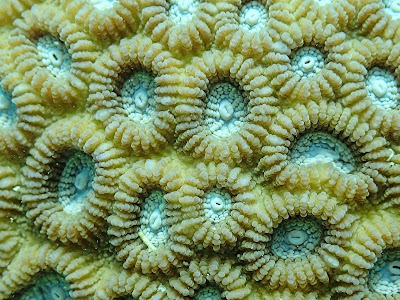A short story about corals #3
Deep-sea corals
Dear faithful
(or new) reader,
Relax and seat
comfortably, it’s time to chill for a while.
Imagine one
minute, you are in a nice lagoon, you just finished to drink your fresh coconut
cocktail and you decide to go for a swim in the warm water. The sun is hot, you
can hear the tropical birds from the island singing in the jungle far away. You have your
mask, your snorkel and you start to nicely swim until you get to the reef. You calmly put
your head underwater and the magic happens. Structure of incredible architecture
and complexity appear, with colour you never suspected the existence, and
graceful living forms flying around them. The wonderful ballet of colours stuns you for a while and you have to take back your respiration at the surface, but
more by the emotion caused by the surprisingly beauty of this underwater world than
from the real need of breathing.
Now will you
believe me if I tell you similar paradise exists in the deep water of the ocean
with temperature closes to -1° C. I know it sounds less attractive for you but
let’s travel up to 6000m under the Ocean surface. Here the light is absent, it’s surprisingly peaceful and quiet. If you light up the place you
will see that the cold-water reef doesn’t have to blush in front of his
tropical homologue. The diversity of
corals species is abundant and if you have followed the previous “short story about
corals”, a question should be coming to your mind right now!
 |
| The amazing diversity of deep-sea coral reefs |
How those corals
can survive without sun light? Well, first I must tell you that we don’t know so
many things about deep water corals yet, even if Science is looking at them
minutely now. Probably because most scientists prefer to study in a paradisiac
place than in the freezing water of the continental shelve… and I am not really
in the good position to criticize that.
So, the deep-water
corals do not require zooxanthellae to survive in the dark Ocean. They are often
orientated in the direction of the current flow and in areas with high current
speed. It’s not hazardous, indeed, as a sessile organism, he fed on planktons. Each individual
can contain thousands of polyps. When the tentacles are out, if for example a
fish larvae wandering in the current touch just once the tentacle, a violent
poison is then inoculated in the larvae via specialized cells called
nematocysts (Exactly like the jellyfish who is going to sting you this summer).
Dinner is ready!
They are
incredibly diverse and old! Yes, old is the correct word. Those fellas can
reach more than thousand years old. In Hawaii, researchers showed that a colony
of Leiopathes sp. was around 4 265
years old. And it’s not finished! Our dear human in white coats also found that
due to the constant regeneration of the polyps some deep-sea corals colonies
were still growing after 40 000 years old of existence! When you are that old
it’s a sign that you are really though, and if you are though it can be really
interesting for us.
Do you see it coming reader?
The deep-sea
corals are a huge interest in medicine. Indeed, some organisms who live among
the corals have fascinating chemical compounds with anti-viral,
anti-inflammatory and even anti-tumor properties. Maybe the problem of cancer
could be solved by looking in our deep cold water. And who knows how many secrets
that we can use are hiding the deep-sea corals?
But you know
Humans, right? They are able destroy things they don’t even know and that can
bring a lot to them. So, worldwide the deep-see corals reefs are already
endangered, threatened mainly by the deep sea trawling: a technic that we should
seriously banned in all the oceans (it was finally banned in Europe last year, yippee),
also oil and gas exploration and are two villains from the previous episode: Global
warming and ocean acidification.
 |
| A deep reef after a trawling |
How can we
destroy natural structure old of thousands of years full of knowledge in a second?
“It’s a sad
thing to think that nature speaks and mankind does not listen” Victor Hugo
Talk to you soon again!
Léopold
If you are more
interested by deep sea corals here a really good website where I find my infos:
-Lophelia.org
-http://ocean.si.edu/deep-sea-corals
Sources images :
https://images.duckduckgo.com/iu/?u=http%3A%2F%2Fmedia-cache ak0.pinimg.com%2F736x%2Fdf%2F09%2Fa3%2Fdf09a319ed1df4e5747f05f45ee0bb75.jpg&f=1
https://images.duckduckgo.com/iu/?u=http%3A%2F%2Fsafinacenter.org%2Fwp-content%2Fuploads%2Ftrawled-coral-reef-NOAA.jpg&f=1



Comments
Post a Comment